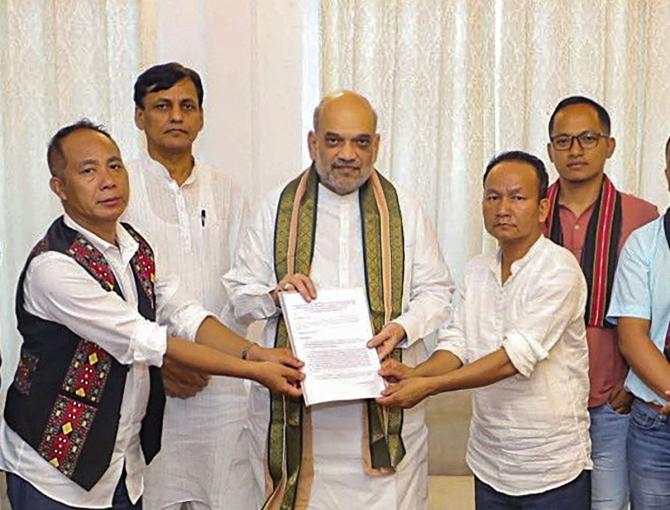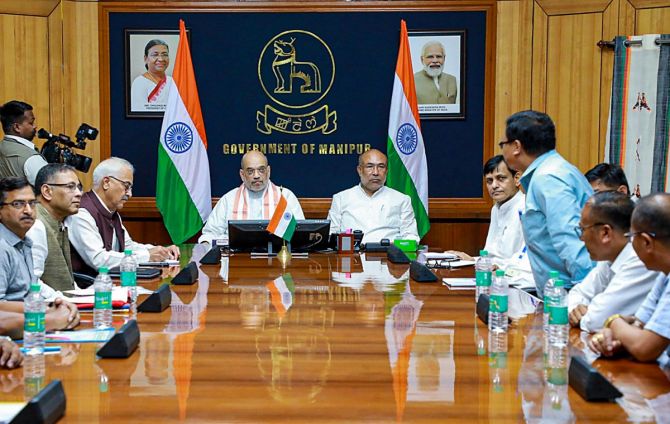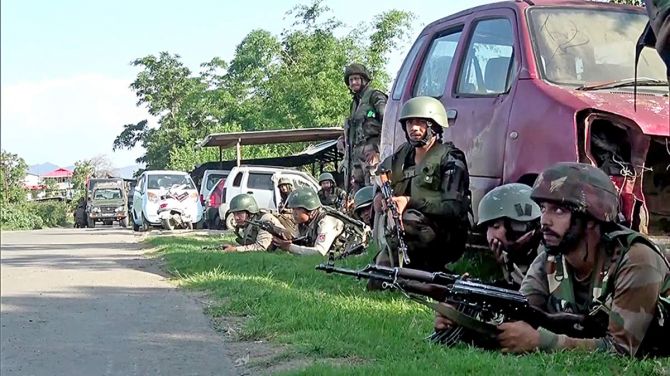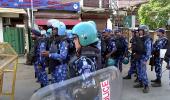'...through the will of the people and commitment of leaders.'
'It may not happen today or tomorrow, but it will happen.'

The border state of Manipur has been engulfed in violent clashes between the Meitei and Kuki groups that has claimed 80 lives in 27 days. Over 30,000 people have been displaced as villages have been attacked and houses burnt.
The state is home to 35 ethnic groups and hasn't seen such violence between ethnic communities in the past. Over 10,000 personnel from the Indian Army and the Assam Rifles have been deployed along with central armed police forces and the Manipur police.
"There is a lot of rumour mongering and people should not fall prey. The conflict is not between Christians versus Hindus, tribals versus non-tribals or majority versus minority, it is between two communities. People should not fall prey to rumours," says retired Lieutenant General Konsam Himalay Singh, the first officer from the North East to be appointed a three star general in the Indian Army.
The general is a member of the Manipur government's consultative committee on Naga Peace Talks.
The officer retired after 40 years of distinguished service in the Indian Army during which he led an infantry battalion during the Kargil War and commanded a battalion in the highest battlefield of the world, the Siachen Glacier.
The general later commanded an infantry division and a corps at the Line of Control facing Pakistan and also oversaw counter-terrorist operations in Jammu and Kashmir.
"India has a 1,760 km open border with Myanmar which has been in the throes of political instability... Common ethnic groups live on either side of the border. Some insurgent groups operating in India have direct linkages across the border and are trained and supported by China in the past," General Himalay Singh tells Rediff.com's Archana Masih in a phone interview from Imphal.
In your understanding, was the Manipur high court decision to examine the possibility if the Meiteis could be considered a Scheduled Tribe what triggered the violence?
Or were there other reasons for the conflagration?
The high court verdict may have been one of the the triggers, but the pressure had been building up for a long time.
There were several other actions taken up by the state government like the war on drugs, clearing encroachments in the reserve forest, illegal migration and longstanding historical issues that raised the tension between the groups.
I am not going into the merits or demerits of these actions taken by the state government, but the high court judgment may have been one of the triggers that has led to the conflagration and violence.
Why has the military and the Assam Rifles been unable to bring the violence under control?
That the army chief had to visit Manipur was a grim reminder of how serious the situation is.
The army and Assam Rifles rescued over 30,000 people who fled their homes in various districts and provided them food and shelter for weeks. They are doing their best in the prevailing circumstances.
The situation in the state would have deteriorated without the army and Assam Rifles. The impression is, however, in the minds of certain sections of the population.
The forces are faced with a dilemma when dealing with heavy violence and mob-like situations when hundreds and thousands of people come out on the streets, in the hills or the fields.
Security forces have to be extremely careful about the use of force while dealing with civilian unrest because it could harm innocent lives.
Manipur does not have a large army deployment. The law and order falls in the purview of the Manipur police which is a huge force, but unfortunately its efficacy was reduced because of the ethnic divide.
Many companies of the CRPF, RPF, GRP were flown into the state. Paramilitary forces were in the process of orienting themselves to the existing security situation.
There is an impression amongst the people here that the main force that should have stopped the perpetrators of violence could have done better.
There is also rumour mongering that the police and paramilitary are siding with one side. Actions to allay such fears must be taken early.

Armouries looted and the chief minister referring to the 40 Manipuris who were killed as 'terrorists', something we don't think we have heard a chief minister of an Indian state apart from Kashmir say.
Kuki MLAs from the BJP have alleged that radical Meitei organisations are indulging in ethnic cleansing.
If this is true, isn't it a dangerous portent for Manipur as well as the integrity of the nation?
The unfolding events indicate a dangerous internal security situation in Manipur and the region. It can have external ramifications also.
I do not agree with general allegations of ethnic cleansing by any group because most of the people were operating from a state of fear to protect themselves from violent mobs.
In a conflict of such magnitude, there is all round fear.
One needs to look at a holistic assessment of people killed, look at the number of villages burnt, houses burnt and people displaced to arrive at such allegations.
In any case, a judicial inquiry should bring all this out early.

What danger does this conflict pose to the country's external security?
India has a 1,760 km open border with Myanmar which has been in the throes of political instability.
The India-Myanmar border has a Free Movement Regime wherein people from tribes living along the border can travel to the either side up to 16 kilometres without a passport or visa.
Common ethnic groups live on either side of the border. Some insurgent groups operating in India have direct linkages across the border and are trained and supported by China in the past.
A prolonged ethnic conflict in Manipur can lead to a dangerous situation because anti-national elements will exploit the clash within our borders.

Can the Meiteis and Kukis overcome the mistrust caused by this month's violence and live together?
Or is that unlikely in the short term and maybe even in the long term?
All the 36 communities in Manipur have lived together for hundreds of years.
The kingdom of Manipur extended for nearly 2,000 years old and all these ethnic groups have contributed in the making of the kingdom.
Our economy, geography and history suggests that we cannot live without each other. We are destined to live together.
Peace can return to Manipur through the will of the people and commitment of leaders. It may not happen today or tomorrow, but it will happen.

What will it take to restore normalcy in Manipur?
1. The state has to end violence by employing effective use of force. It is already 26 days of violence and innocents are suffering, therefore violence has to be controlled immediately.
2. Confidence building measures have to be undertaken by politicians, civil society members through negotiations and peace initiatives.
3. The 30,000 displaced people have to return to their homes because it is a very emotive issue.
4. Armed groups have to be taken care of sooner than later.
5. Long term measures have to be formulated to ensure that all groups meet their legitimate demands and to protect the interests of the country and the state.
Feature Presentation: Aslam Hunani/Rediff.com











 © 2025
© 2025